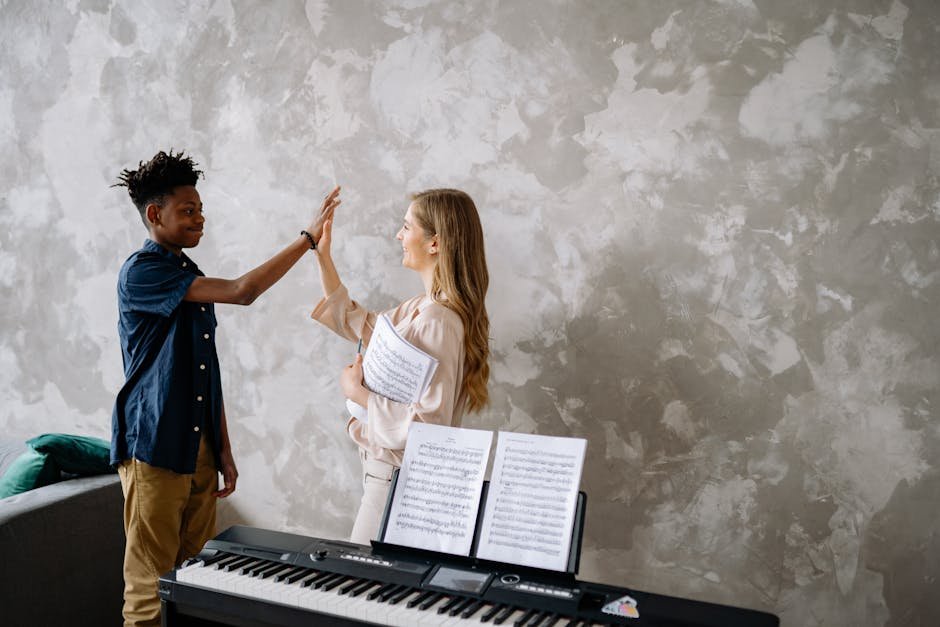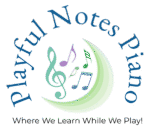🎹 Why Setting Piano Goals Matters
When it comes to learning the piano, consistency is important—but intentionality is what truly drives progress. Whether your child is a brand-new beginner or moving into more advanced pieces, setting clear piano goals helps turn practice time into meaningful progress.
Every time we sit down to practice, we should go into it with a specific goal in mind. Without that, it’s easy to simply run through a piece without purpose, missing opportunities to fix mistakes, strengthen technique, or build confidence. When we practice without goals, we often don’t know what we’re working on—or even when we’re “done.”

🎯 What Are Piano Goals, Exactly?
Piano goals are small, achievable targets your child can aim for during a practice session or over the course of a week. They give structure to practice and create a clear finish line. Goals help answer questions like:
- What should I focus on today?
- How will I know when I’ve improved?
- What would success look like for this piece?
These goals don’t need to be huge. In fact, the best goals are the ones that feel just challenging enough—without being overwhelming.
🎵 Piano Goals for Early Beginners
For new students, goals should be simple, concrete, and focused on developing foundational skills. Here are a few examples:
- Count aloud while playing your song
- Tap each note and name it before playing
- Use the metronome at half speed
- Play the song slowly enough that you don’t make any mistakes
- Play the piece from start to finish without stopping
These small objectives build focus, coordination, and confidence. They also help your child understand that practice isn’t about being perfect—it’s about showing up with intention.
🎶 Piano Goals for Developing Students
As students grow, piano goals can become more detailed and musical. Here are some examples of what that might look like:
- Play the entire piece using every dynamic marking
- Practice with the metronome slower than performance speed, then gradually increase tempo throughout the week
- Memorize the first four measures
- Play Section B perfectly five times in a row
- Refine your phrasing in the left hand of the second page
These types of goals challenge the student to go deeper, listen more closely, and take ownership of their musical growth.
✅ Make Sure the Goal Feels Doable
No matter what level your child is at, it’s important that their piano goals feel manageable. If a goal is too big or vague—like “learn the whole song perfectly by tomorrow”—it can lead to frustration and defeat. That’s when we hear things like “Piano is too hard” or “I’m not good at this.”
Instead, help your child set a goal they can meet. That sense of success will build momentum and motivation. Even something as simple as:
- “Learn to play my song without stopping”
- “Play my piece with an even tempo”
- “Fix the last two measures today”
…can keep things moving in a positive direction.
🫶How Parents Can Help with Piano Goal Setting
As a parent, you can support your child’s goal-setting by:
- Reviewing their weekly assignment sheet together
- Asking what their goal is before each practice session
- Celebrating small wins (“You played that with no hesitations—great job!”)
- Helping break down large tasks into smaller steps
- Encouraging consistency over perfection
If your child isn’t sure what their piano goals should be for the week, don’t worry—that’s completely normal! Encourage them to ask their teacher during the lesson. Part of growing as a musician is learning how to identify what needs work and how to break it into smaller, achievable steps. As your child’s teacher, I’m always happy to help set realistic, motivating goals that match their current skills and keep things feeling fun and encouraging. Sometimes, just having one small goal to focus on can make the whole week of practice feel more manageable.
📝 Final Thoughts
Piano goals turn random repetition into real progress. They give every practice session a sense of purpose and direction, helping your child feel successful and confident—whether they’re playing Mary Had a Little Lamb or a movement by Mozart.
At Playful Notes Piano Studio, I help each student learn how to set and achieve goals that are right for them. With guidance, support, and a little strategy, piano becomes more than just an activity—it becomes a meaningful, rewarding journey. 🎶

